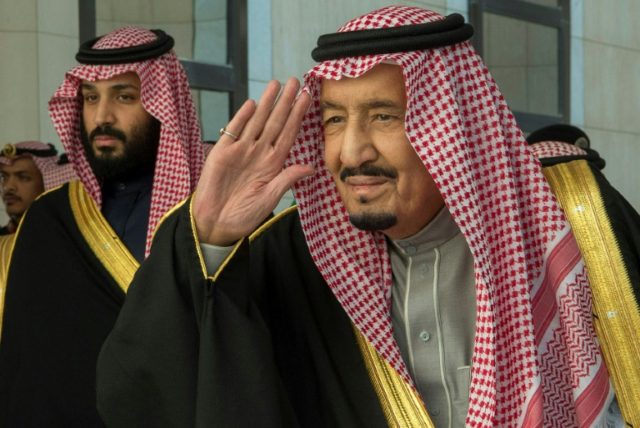King Salman bin Abdulaziz ordered an overhaul of government posts and shook up the cabinet on Thursday, most notably replacing Foreign Minister Adel al-Jubeir.
The Associated Press (AP) portrayed the shakeup as fallout from the murder of Jamal Khashoggi, but also as an effort to consolidate power by Crown Prince Mohammed bin Salman (MBS), since many of the new appointees are close to him.
As the AP pointed out, MBS holds numerous high offices in the Saudi government, including deputy prime minister and defense minister, so any big shakeup would be seen as a reflection on his current status in the government. His position seems quite secure despite allegations that he ordered the murder of Khashoggi, especially when considering the replacement of Foreign Minister Adel al-Jubeir with Ibrahim al-Assaf, a former finance minister with ties to the crown prince:
Al-Assaf is well known to international investors, having led several Saudi delegations to the World Economic Forum in Davos. He served as finance minister under King Fahd and King Abdullah.
Al-Assaf sits on the boards of oil-giant Saudi Aramco and the kingdom’s sovereign wealth fund. The crown prince oversees both entities. He holds a Ph.D. in Economics from Colorado State University and a master’s degree from the University of Denver, according to his biography on Aramco’s website.
Al-Assaf was one of many Saudi royals and high officials detained during the wide-ranging crackdown on corruption MBS launched soon after he became the crown prince, but al-Assaf apparently did not spend much time incarcerated at the Riyadh Ritz-Carlton, if indeed he was ever detained at all. He was serving as minister of state at the time and quickly reappeared at cabinet meetings.
The Associated Press ran through a few other notable sackings and reassignments, at least one of which fills the void left by one of the most important people connected to the Khashoggi murder:
The changes announced Thursday include aides to the crown prince, including Musaed al-Aiban as national security adviser — in addition to other positions he holds — and former media minister Awwad al-Awwad as adviser to the royal court. Khalid al-Harbi was named as head of general security.
Turki al-Sheikh, a confidant of the crown prince, was removed as head of the Sports Authority and replaced by Prince Abdulaziz bin Turki al-Faisal. This means al-Sheikh no longer oversees a cybersecurity and programming body that was led by Saud al-Qahtani, a close aide to the crown prince who was fired from his post and sanctioned by the U.S. Treasury Department for helping to mastermind the plot that led to Khashoggi’s killing.
[…]
Al-Sheikh will now lead the General Entertainment Authority, a body created in recent years to help organize and promote concerts and other events that had long been banned in the conservative country.
The BBC thought al-Jubeir was clearly suffering a demotion after taking point on the monarchy’s diplomatic and media response to the Khashoggi murder. The New York Times was puzzled by the replacement of Jubeir, a seasoned diplomat well known in the West, with the more obscure and seemingly less qualified Assaf.
The Financial Times speculated King Salman wanted to replace a few powerful officials close to his son with people he can trust, noting that the new appointees tend to be older and more experienced than the young officials they are replacing. The goal, as FT put it, might be to confirm MBS is secure in his position while also installing some “checks and balances to rein in some of Prince Mohammed’s rasher impulses.”
“The king also ordered the reconstitution of two bodies chaired by Prince Mohammed that have been vital to his consolidation of power — the Council of Economic and Development Affairs and the Council of Political and Security Affairs. The crown prince will, however, continue to head them,” the Financial Times added.
Another part of the king’s restructuring plan hinders the ability of MBS to control the National Guard, which in Saudi Arabia is an elite military unit that protects the huge royal family. This might have been done to reassure royals worried about MBS conducting another crackdown or purge.
The Wall Street Journal reported on Wednesday that while foreign investors have been critical of the Khashoggi killing, they have largely decided to stick with the Kingdom instead of selling their assets and withdrawing from joint projects.
The report noted that some business executives made symbolic gestures of condemnation, such as backing out of high-profile conferences, but did not substantially alter their business relationships with Saudi Arabia. The Saudis pronounced themselves untroubled by a few empty seats at conference tables.
“This whole Khashoggi thing doesn’t mean anything. It means much less than the big, sweeping liberalization that’s happening in the kingdom,” hedge fund manager John Burbank told the Journal.
“One person’s life doesn’t matter unless it’s MBS’s. Khashoggi doesn’t matter,” Burbank added, accusing those investors who pulled out Saudi Arabia but remain in business with authoritarian states like Russia and Turkey of hypocrisy.
One of Burbank’s associates, investor Matt Michelsen, conceded “there were mistakes made” by MBS during his rise to power but insisted “this place is changing.”
“I saw Starbucks opening on multiple corners. There are women walking around without abayas. It’s a fundamental shift that’s occurred,” he said.

COMMENTS
Please let us know if you're having issues with commenting.